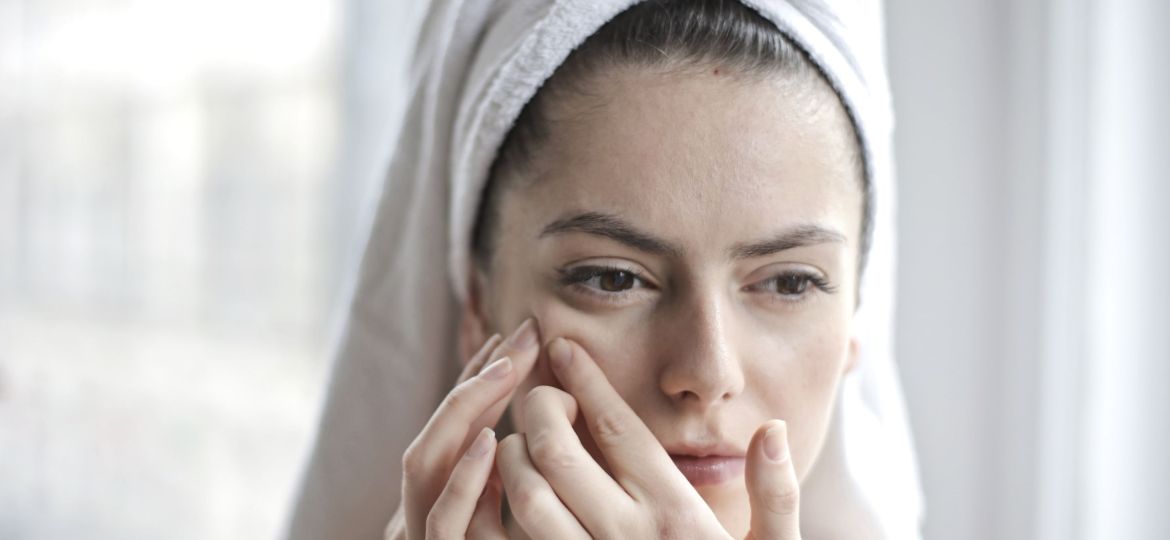
What is Acne?
You may be wondering what causes acne. It starts with oil production in your skin, which begins around puberty when your oil glands become active. To keep your skin and hair well-lubricated, your body depends on sebaceous glands located under your skin. These glands secrete an oily substance called sebum, which coats your skin and hair to prevent them from drying out. Sebum travels up follicles and out through your pores onto the surface of your skin. Your hair follicles routinely shed dead skin cells, which sebum carries out of your body.
Overproduction of sebum and dead skin cells can stick together and clog your pores, resulting in skin blemishes. Then, bacteria that normally exist in small amounts on your skin can flourish in the sebum in the clogged pores, leading to inflammation. The inflammation will result in a condition called acne or commonly, pimples. Depending on where the clog is located, you may see whiteheads or blackheads.
When the sebum and bacteria stay below the skin surface, a whitehead is formed. A blackhead occurs when the trapped sebum and bacteria partially open to the surface and turn black when exposed to the air. Commonly involved areas are the face, neck, chest, shoulders, and upper back.
DIFFERENT TYPES OF ACNE:
• Blackheads are small, dark spots on the skin caused by a plug in the opening of a hair follicle. They are also called Comedones
• Whiteheads occur when your open pores are clogged by dead skin cells, oil, or bacteria, leading to their development
• Papules are small, inflamed, and well-defined bumps on your skin caused by excess oil, bacteria, hormones, and medication. They are also known as pimples or zits. Papules are red in color and feel hard without a white or yellow pus-filled tip
• Pustules are small bumps on your skin with a yellow pus-filled tip surrounded by red skin
• Nodules are unusual lumps (growths) of cells on your thyroid gland. They are firm, painful, and develop deep under your skin
• Milia are small, dome-shaped, white bumps under your skin and can be seen on a newborn baby’s skin
• Cysts are lumps that may be filled with air, fluid, or other material
WHAT FACTORS CONTRIBUTE TO ACNE?
hormonal changes, particularly a rise in testosterone, which can lead to sebum overproduction. This is why acne occurs during the teen years, although it can also occur at any age. Bacteria, certain medications, and genetics are other common reasons for acne.
WHAT ARE THE TREATMENT FOR ACNE?
• Over-the-counter lotions with active ingredients such as benzoyl peroxide can kill bacteria, dry excess oil, and remove dead skin cells clogging pores. Salicylic acid slows the loss of skin cells to prevent clogged pores and may also break down whiteheads or blackheads. Alpha hydroxy acids, such as lactic acid, help remove dead skin cells, reduce inflammation, and stimulate the growth of new, smoother skin. Sulfur removes dead skin cells and dries excess oil.
• Oral medication: Your dermatologist may prescribe oral medication for moderate to severe cases. These may include oral antibiotics that kill bacteria and reduce inflammation. Isotretinoin is only prescribed for severe cases. For women, birth control pills containing estrogen may be prescribed to minimize the effects of testosterone.
• Laser therapy uses light to selectively target and eliminate acne at its source, ranging from mild to severe cases. There are several different machines on the market, but Fotona is a state-of-the-art medical-grade machine that can treat persistent active acne or cystic acne. Fotona uses two different wavelengths, including Nd:YAG (YAG laser) and Er:YAG (erbium laser), to effectively treat various forms of acne.
HOW COMMON IS ACNE?
Approximately 85% of people experience acne at some point in their lives, making it one of the most prevalent skin disorders worldwide.

